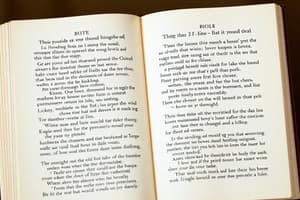Podcast
Questions and Answers
Foreshadowing provides hints about future events in a narrative.
Foreshadowing provides hints about future events in a narrative.
True (A)
An allegory consists of straightforward storytelling with no hidden meanings.
An allegory consists of straightforward storytelling with no hidden meanings.
False (B)
An analogy compares two different things to provide clarification.
An analogy compares two different things to provide clarification.
True (A)
A metaphor includes a comparison where one thing is said to be another.
A metaphor includes a comparison where one thing is said to be another.
Ambiguity in language allows for only one clear meaning.
Ambiguity in language allows for only one clear meaning.
Euphemisms are used to intensify the impact of statements.
Euphemisms are used to intensify the impact of statements.
Irony reveals a reality that is consistent with appearances.
Irony reveals a reality that is consistent with appearances.
A foil character serves to highlight the traits of the protagonist through contrast.
A foil character serves to highlight the traits of the protagonist through contrast.
Flashcards
Foreshadowing
Foreshadowing
Information or events hints at a future scenario in a story.
Allegory
Allegory
A story or poem with a hidden meaning, often a moral lesson.
Analogy
Analogy
Comparing two different things to explain or clarify a concept.
Metaphor
Metaphor
Signup and view all the flashcards
Allusion
Allusion
Signup and view all the flashcards
Ambiguity
Ambiguity
Signup and view all the flashcards
Foil Character
Foil Character
Signup and view all the flashcards
Euphemism
Euphemism
Signup and view all the flashcards
Study Notes
Literary Devices
-
Foreshadowing: A hint or clue about a future event or scenario.
-
Allegory: A story with a hidden meaning; a moral or a message.
-
Analogy: A comparison to explain or clarify something.
-
Metaphor: A direct comparison between unlike things, saying one is the other.
-
Allusion: A brief reference to a person, place, event, work of art, or myth.
-
Ambiguity: A word or phrase with multiple possible meanings. Poems may use ambiguity to add depth.
-
Apostrophe: Speaking directly to a person, abstract idea, or inanimate object (e.g., "O Captain, my Captain!").
-
Euphemism: A less harsh way of saying something unpleasant (e.g., "at rest" for "dead").
-
Hyperbole: An extreme exaggeration.
-
Irony: A difference between appearance and reality.
-
Metonymy: Referring to something by something closely associated with it (e.g., "the White House said..." referring to the U.S. government).
-
Oxymoron: A combination of contradictory words (e.g., bittersweet).
-
Paradox: A seeming contradiction that reveals a truth (e.g., "To keep peace, you must prepare for war").
-
Synecdoche: Using a part to represent the whole (e.g., "all hands on deck").
-
Synesthesia: Describing one sense in terms of another (e.g., "loud aroma").
Character Development
- Foil character: A character who contrasts with the main character (protagonist), highlighting the protagonist's traits. For example, if the protagonist is brave, the foil might be cowardly.
Studying That Suits You
Use AI to generate personalized quizzes and flashcards to suit your learning preferences.




